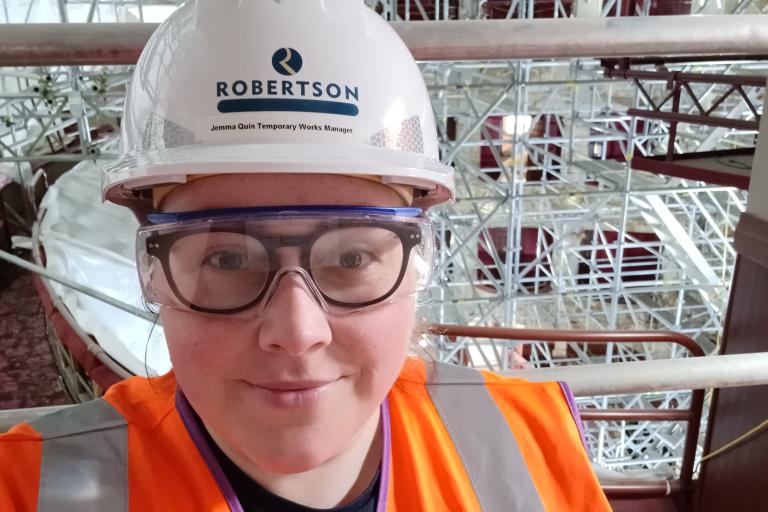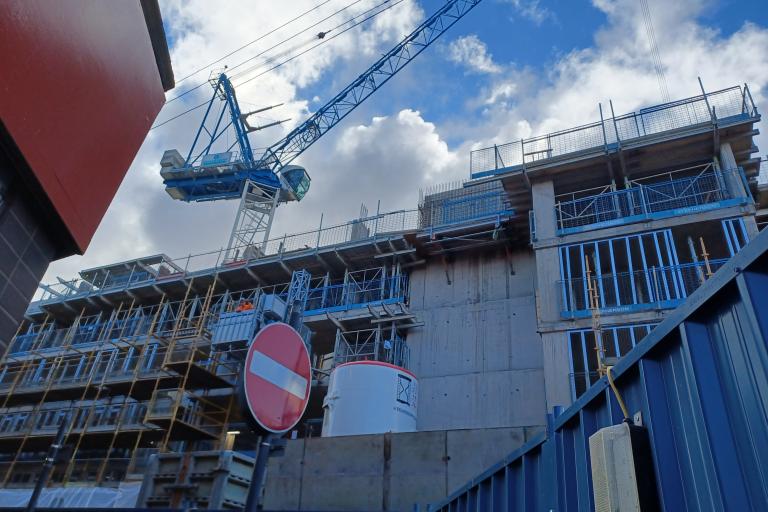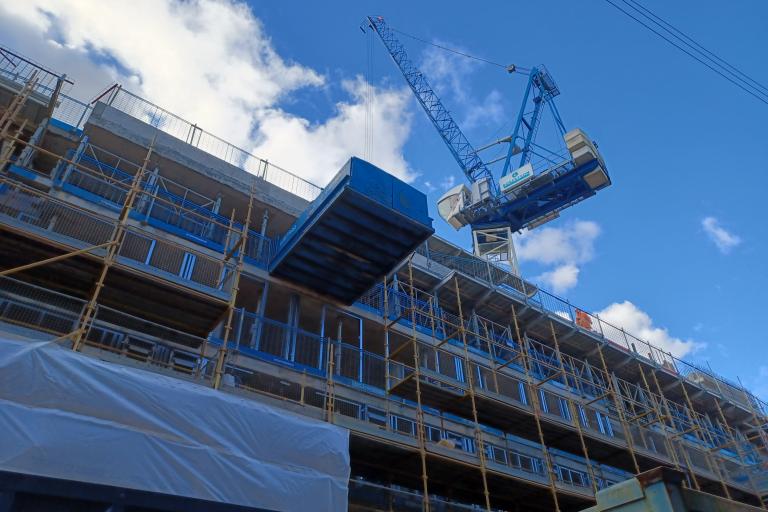
Careers in construction: Jemma on temporary works
Take note, temporary works happens on every construction site. We caught up with Jemma, a Temporary Works Manager at Robertson, to find out more about the less permanent side of construction and her career progress so far.
Tell us, what are temporary works?
These are the pieces of engineering that generally aren't included in the permanent works design. They facilitate the construction of permanent works by providing access or support for people, a structure or plant. For instance the props to support a building; foundations for site cabins; scaffold to help the site team work at height; design checks to ensure the ground can take the weight of plant, e.g. a crane coming onto site.
There's a lot of planning involved in terms of logistics and sequencing of works – my job is to make sure we’ve got the people, systems and processes in place to build things safely and efficiently.
What was your route into temporary works?
I studied civil engineering at university, but it wasn’t until I was working on a construction project that I first heard about temporary works. We needed a thrust block for a pipe that was being installed – basically a huge piece of concrete that the pipe could lean against while we pressure tested it. A colleague asked for a temporary works design – I had no idea what they meant, so asked, and that was my introduction.
I went on to do a training course in Temporary Works Coordination and from there a placement to learn about the design aspect, all through the company I was working with at the time. That gave me the experience to take up my first role as Temporary Works Coordinator.
What do you enjoy about your role as Temporary Works Manager?
Most definitely the scope – temporary works isn’t standalone but touches every part of a construction project. I can be involved at the tender stage of a project to advise on temporary works solutions and sequencing – which ultimately impacts the project length and cost – right through to design, build and logistics planning. It's a role that brings something new to do or learn almost every day.
Temporary works in image
Why choose a career in construction?
Seeing the Falkirk Wheel being constructed was a big influence. When I was at school my dad and I often walked along to a nearby viewpoint to watch it being assembled. I was interested in STEM subjects (Science, Technology, Engineering and Maths) and had taken part in the Scottish Space School where I learned about the engineering behind NASA’s missions. So going forward with engineering and construction seemed like a natural step for me.
Once you start in construction you realise it's an industry with fantastic professional and personal development opportunities.
For instance, I currently volunteer as Director of the Temporary Works Forum which is a Technical Knowledge Society of the Institution of Civil Engineers. We aim to create a safer, more efficient industry by educating, writing guidance and acting as a focal point for all temporary works knowledge in the UK. I almost didn’t volunteer, doubting in what way I could contribute, but applied anyway – it shows that we all have the capacity to make positive change.
What types of skills do you need for temporary works?
It's a great job for a problem-solver, someone who will enjoy figuring out not only what we need to build but how we build it. You also work closely with various project teams to get the best logistics and temporary works design, so ideally you'll be a genuine people person too. All the technical knowledge can be learned through formal education and/or on the job training.
You're a real champion of STEM here at Robertson and beyond. Where does that passion come from?
I love what I do, but I also remember that no one told me about the amazing opportunities in construction when I was at school. I want to make sure young people are aware of our industry and the many roles within it.
That’s why in my spare time I volunteer as a STEM Ambassador, visiting schools and taking part in careers events. I've also written 'The Little Civil Engineer and Friends' children's books to share my own adventures in engineering with young people.
And I'm really keen to emphasise that there's more than one route to roles in construction, for example through an apprenticeship or degree apprenticeship as well as doing a degree.
Finally, what are the most valuable lessons you've learned building your career in construction?
One is that it's okay not to have all the answers, so never be afraid to ask for help. If it's something you can safely try to figure out yourself, then give it a go – that's how you learn. And speak to a colleague about the various things you've thought about or tried, that's how some of my best ideas popped up. It's all part of your learning and development.
Secondly, not everyone is going to think, feel or do something in the same way as you. Rather than thinking in terms of right and wrong, you gain so much more by being open to and respectful of other people's perspectives and approaches.



